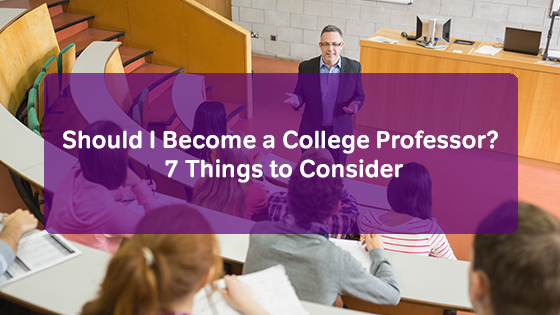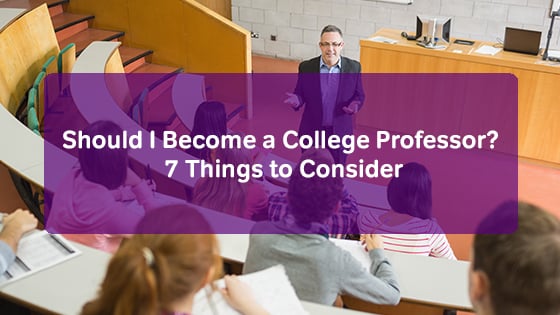3 min read
Should I Become a College Professor? 7 Things to Consider
![]() David Recine
:
Dec 22, 2018 5:31:10 AM
David Recine
:
Dec 22, 2018 5:31:10 AM

If you’re looking into becoming a teacher, you’ve probably thought about all of your options as far as which grade to teach. Licensed school teaching—the kind of work you get with qualifying Praxis scores—is one of the best-known options for those who want to teach.
Another almost-as-prominent option is teaching at the college level. So as you consider exactly where you want to go in your teaching career, it’s good to look at the professor option. Here are ten things to ask yourself as you weigh a potential future career as a college instructor.

1. Do You Have the Time and Energy for Grad School?
To become a professor, you need at least a Master’s degree. Usually you’ll need an even higher level of education than that, however. More often than not, college and university hiring committees either prefer to hire someone with a doctorate or absolutely require a doctorate. Doctorates are time consuming and exhaustive…. And so is the kind of Master’s coursework that can sometimes lead to a degree.
In a Master’s or Doctorate that leads to full-time work as a professor, you’ll be expected to do intense amounts of research, write hundreds and perhaps even thousands of pages, travel to academic conferences, and have top academic performance with as close to a 4.0 GPA as possible. If you are the kind of academic “go-getter” who loves being at the top of your class, then a professor career may be right for you. But you should also consider the possible lack of school-life balance you may have as you work toward your career goal.
2. Are You a Skilled and Enthusiastic Researcher?
It’s important to devote time to research in grad school if you want to be a professor, but your years of research don’t end there. Research obligations continue even after you become a professor. For most college instructor positions, conducting research is either required or strongly encouraged. And you’ll be expected to get your research findings published in peer-reviewed journals on a regular basis.
3. Do You Have an Interest in Education Management and Administration?
A lot of schoolteachers have no interest in managerial work at their school or in their district. And as a school teacher, that’s very much OK! It’s possible to “just teach” throughout one’s K-12 career. In contrast, college professors are expected and required do administrative work at the schools where they teach. College instructors must attend departmental meetings where the policies in their classrooms are discussed and decided, and they are expected to join committees that govern campus policy. This can be rewarding and empowering, but it can also be very time-consuming, taking away from time that might otherwise be spent teaching.
4. Will You Be Able to Get a Full-Time Tenured Position in Your Field?
As a general rule, school teaching jobs are full-time at entry-level. Professorships on the other hand do not always guarantee a 100%-time position. Many college professors teach only part time, with no full-time hours available to them. Whether or not you have a good chance of guaranteed full-time hours depends on two things–the field you teach in and the job market in the place you hope to live and work. Successful full-time professors are either credentialed in a high-demand area or are willing to work almost anywhere . . . or both.
5. Are You Prepared for Possible Reduction in Hours or Layoff?
Schoolteacher jobs tend to be reasonably secure. Every child needs to go to school from K-12, and public education is a well-funded, mandatory initiative in the US. In contrast, professor positions are dependent on changing public needs for higher education. And many college-level teaching contracts explicitly tie work schedules to enrollment. Cutbacks and layoffs are much more possible for professors than elementary, middle, or high school teachers. Before you become a professor, consider your long-term financial obligations. Also look at the other kinds of work you may be qualified for, and be sure you can get temporary supplemental work during semesters and years when your teaching hours may drop below full-time.
6. Do You Prefer Working with Children or Adults?
This is a very important thing to consider. If you become a professor, you’ll work primarily with adults in their late teens and twenties, and you’ll also work with some older adult students, especially if you teach at a community college. You likely won’t teach any children at all. As you consider either teaching K-12 or university teaching, try to do some classroom observations and even some practice teaching with both age groups. You may find you prefer teaching younger learners, you may find you prefer adults, or you may greatly enjoy both kids of teaching!
7. How Much Did You Enjoy Your Own College Years?
The happiest professors—and often the best ones—are people who really loved their own higher education experience. In college, did you ever think to yourself that you wished you could keep learning like that forever? A professor position is a chance to do just that—to keep researching, to keep reading and writing, and to continue being a part of the learning adventure that is higher education. Whatever other factors you weigh, your love of academics should probably be the deciding factor in a decision to become a professor.


